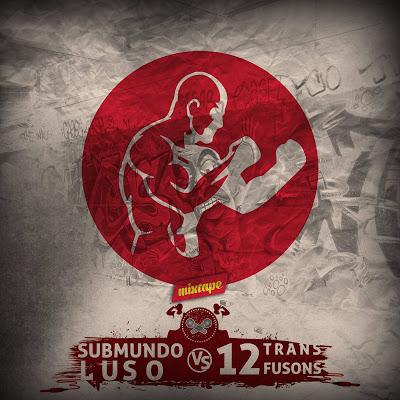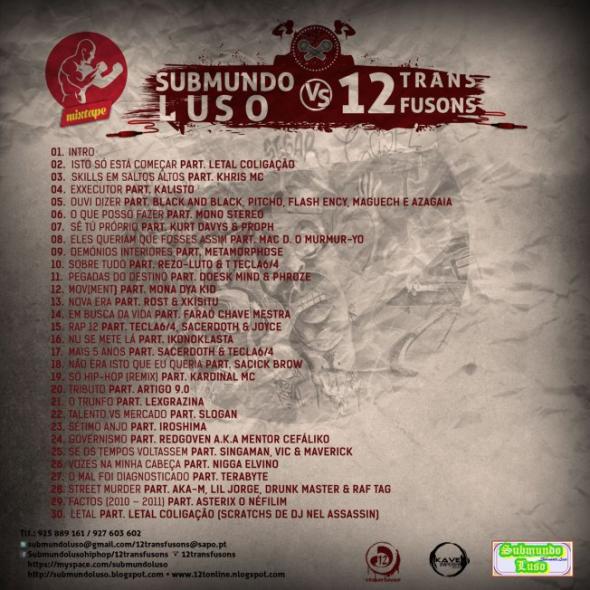Submundo Luso vs 12transfusons, a new Hip-Hop Mix Tape
Submundo Luso vs 12transfusons” is a new mix tape that features rappers from Angola, Mozambique, Brazil and Portugal. Released on New Year’s Eve after five months of preparation, the project brought together hip-hop promoters from the blogs Submundo Luso [pt] in Mozambique and 12transfusons [pt] in Angola. The two met online and the former invited the latter to collaborate.
In this interview for the blog Underground Lusófono [pt], Astérix o Néfilim (Astérix the Giant, in English), a rapper, producer and manager at 12transfusons, talks about the effort, which counted the participation of artists from all over the globe and is now available as a free download. He also shares his views on the artistic scene in Cabinda – a tiny province in the north of Angola – and the challenges caused by such isolation.
How did you get this project up and running?
It came about by choosing artists that suited our aims. We wanted to bring back the roots of hip-hop and to do something a little bit different, a bit “old school”. Normally promoters work with renowned artists, but we wanted to bring together a little bit of everything, from the old school to the new. We also tried to give priority to female rappers and unknown artists, alongside those who have already made a name for themselves in Portuguese-language rap.
How did you choose the artists?
That came after hearing the suggestions of everyone involved at 12transfusons and Submundo Luso. We worked together on this, we had a list of artists, we contacted them directly, although we didn’t get all of the artists we wanted.

What level of interest was there from artists in the prospect of working with you?
In 2011, we released “Mixtape 12transfusons Ed. 2011″ with the same aim, and we had already worked with a few of the artists. This was the case with AKAM-M, MAC D O MURMURYO and ALKAPPA (who was invited to take part but couldn’t).
I’ve got to say that it hasn’t been easy working with MCs, and it’s a constant battle. There are ones that took no notice because they didn’t believe in our work. There are ones that underestimated us and thought what we were doing wouldn’t go mesh well with their image. Others agreed to take part but ended up dropping out. Then there ones that prove RAF-TAG’s “Hip-hopcrites” idea right – the ones that say in their lyrics they are keeping it real, and swear that they are loyal, that they make rap music out of love for the culture and that they do everything for rap (these are the most arrogant ones), but they don’t want to take part.
We are independent producers. Everything that we’ve done up till now we’ve paid for without any help. Despite that, I want to make a shout-out for the effort, time, dedication and hard work of some artists like Khris Mc, IKONOKLASTA, AKAM-47 from Poltersonnik, REDGOVEM, KARDINAL MC Mona Dya Kidi and many other. Also to the staff at 12transfusons with a special shout-out to Absinto and Tecla 6/4 and everyone in Mozambique, Brazil and Portugal.
What has the public reaction been like?
Listen, the response we’ve had has been better than I was personally hoping for. Every day I get compliments, words of encouragement, and congratulations on a job well done. And this, without doubt, is the greatest reward for all our dedication.
How long has 12transfusons been on the market?
12transfusons is an independent production company and has been around in Cabinda since 2010. It has put out various albums, put on various shows and other activities to do with hip-hop. In the group are Astérix the Giant (CEO), Tecla 6/4 (producer), Sacerdote, Rezo-Luto, 02K63, Absinto (designer) and Akônituz e Vars (producer). These last guys are the ones that represent production in the capital. Absinto and Akônituz were part of the group Artigo 9.0 and together we are the collective LETAL.

How do you view music – in particular rap music – in Cabinda?
I would be lying if I said that things are good because they really aren’t and there is still a lot of work to do so that people accept our culture and pay it more attention.
In Cabinda, it’s not only rap that’s finding it tough. The situation is reflected in all musical styles, everything from kuduro, kizomba and samba to kintueni and mayeye. The truth is that the music being made in Cambinda doesn’t get promoted. We have a completely non-existent culture secretary with next to no social communication. Nothing justifies the fact that in a province with so many talented artists only two albums a year get released and there are only a few radio stations that support projects like ours.
Returning to rap, this is the least requested for governmental events and rallies, even though it is what represents people the most. This is thanks to the efforts of all of the comrades in arms such as Cabmusic and Miller Team, among others. Each day that goes by there are new ideas coming up, new MCs and producers interested in giving the movement more life. This makes me very happy.
In your opinion, what needs to be done to change the situation in Cabinda?
Firstly, valuing our music. It’s important to get people used to hearing our music. The people of Cabinda are known as “prudes” and for not going to shows or buying albums. We have to encourage them to go to our concerts and to buy our CDs. But we can’t act alone.
The culture secretary for this province needs to play this role through social communication, in this case radio stations and TV channels – even though Cabinda doesn’t have any television stations, neither public nor private – in an attempt to reverse the situation. Perhaps create programs that help promote local music, support for musicians, stop inviting musicians only for political campaigns and governmental events. The fee for local musicians should be the same as for musicians that come from Luanda or from any other part of the world so that they feel valued. A local television station would help promote the image of local artists. The truth is, Cabinda lacks private radio and television stations that can mix things up and break the routine of local news. While this isn’t happening, we will continue here. We know what our battle is and we will continue to stand firm.
What projects are on the cards for this year?
12transfusons doesn’t stop. I have a fantastic team that loves working and is always willing to get its hands dirty. After this mixtape we’re going to launch Ruaportagem [a play on the words “street” and “report”] from the group Artigo 9.0, which is an EP that we have been working on and only this year finally able to get it out on the streets. We hope people are going to like it because we’re putting a lot of energy into it.
What is “Ruaportagem”?
It’s a way of looking at how thing are on the street, the problems people have, the different ways of surviving, and the daily sacrifices people make.